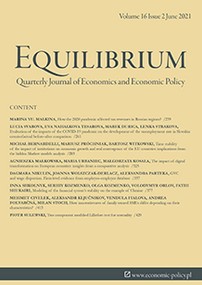Cross-border cooperation at the external border of the European Union in the context of political, economic and social conditions: the case of the Polish-Russian neighbourhood
Cross-border cooperation at the external border of the European Union in the context of political, economic and social conditions: the case of the Polish-Russian neighbourhood
Author(s): Iwona M. Batyk, Daniel RzeczkowskiSubject(s): International relations/trade, Politics and society, Tourism, Socio-Economic Research
Published by: Instytut Badań Gospodarczych
Keywords: Polish-Russian cross-border cooperation; external border of the EU; political and economic conditions; social relations;
Summary/Abstract: Research background: Integration and globalization processes encourage activities for the development of border regions. For the north-eastern regions of Poland and the Kaliningrad region, cross-border neighbourhood enables regions to cooperate and provides an opportunity for economic and social recovery. Purpose of the article: The present article aims to analyse areas of cross-border activity taking place on the Polish-Russian borderland, based on the opinions of the inhabitants of the Kaliningrad region. Taking into account the rapidly changing political and economic conditions, as well as social relations, the following areas of Polish-Russian cross-border cooperation have been examined: economic activity, tourism, social activity, scientific cooperation, neighbourly relations. Methods: The study presents the results of the author’s own research carried out using standardized interviews with 1,022 inhabitants of the Kaliningrad region. As the research instrument, a self-designed interview questionnaire. The adopted time frame encompassed four stages of the functioning of Polish-Russian cross-border cooperation, each of them different due to political, economic and social conditions. The sample was selected using the quota method. The correspondence analysis was used for statistical tools. Findings & Value added: The suspension of local border traffic has significantly limited the development of cross-border cooperation. The Polish-Russian relations, encumbered with high risk and uncertainty, have led to a considerable decrease in cooperation between border areas. The level of risk results not only from mutual relations between Poland and Russia, but is also a consequence of political and economic relations between the European Union and the Russian Federation. In the long term perspective, local border traffic may be open and similar conditions for the functioning of cross-border cooperation may occur. Therefore, knowledge about the activity of cross-border residents of Polish-Russian border regions will be useful in counteracting the undesirable effects that may occur.
Journal: Equilibrium. Quarterly Journal of Economics and Economic Policy
- Issue Year: 15/2020
- Issue No: 4
- Page Range: 833-871
- Page Count: 39
- Language: English

